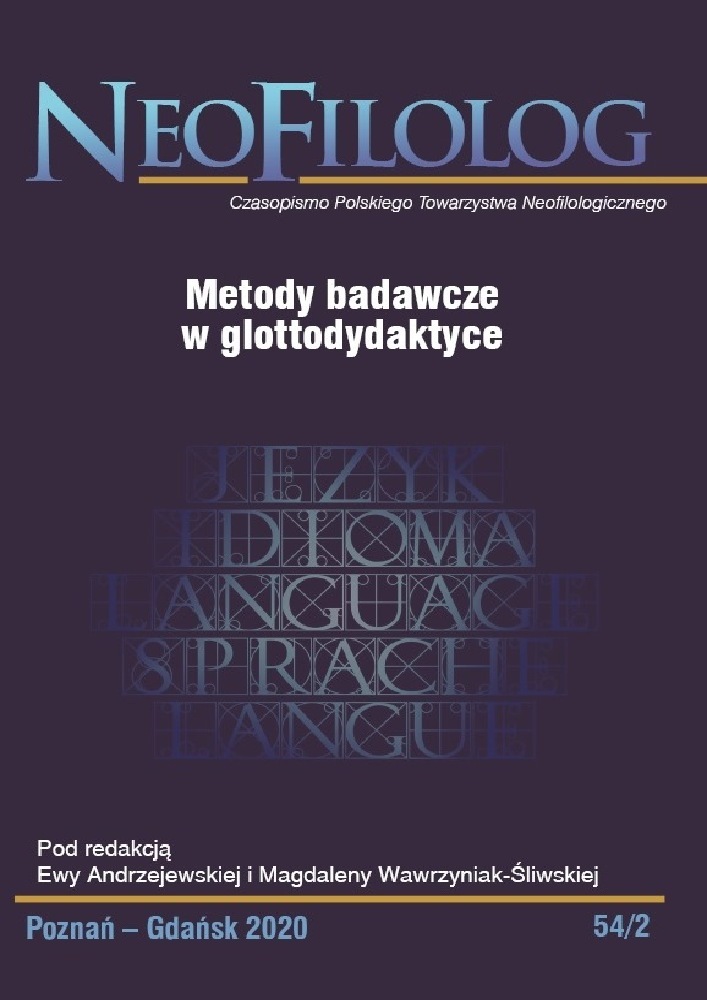Abstract
The aim of the article is to reflect upon the possibilities offered by triangulation in qualitative research, with particular emphasis placed on action research. Various types of triangulation have been presented, including the most recommended multiple triangulation. A variety of advantages and functions of triangulation have been shown, first and foremost the ones which refer to dynamic, systemic and multicausal phenomena. All the theoretical considerations have been illustrated by the author’s own research conducted in Poland, in one of the bilingual sections with Spanish language in the secondary school. The research concerned the development of students’ discursive competence within the genre of an intercultural comparison, and its conditioning. The research used multiple triangulation: of data sources, of researchers, of methods and of data analysis, as well as temporal and special triangulation. The investigation is finished with conclusions of methodological nature.
References
Aguilar S., Barroso J. (2015), La triangulación de datos como estrategia en investigación educativa. (En) “Píxel-Bit. Revista de Medios y Comunicación”, no 47, pp. 73-88.
Aleksandrzak M., (2004), Metodologia action research w badaniach nad autonomią ucznia.
(En) Pawlak M. (red.). Autonomia w nauce języka obcego. Poznań-Kalisz: Wydział
Pedagogiczno-Artystyczny UAM w Poznaniu. pp. 111-124.
Alonso Belmonte I. (2016), La subcompetencia discursiva. (En) “Vademécum para la
Formación de Profesores” Sánchez Lobato, J., Santos Gargallo, I., Alcobendas (Madrid): SGEL pp. 553-572.
Alzás García T., Casa García L. M., Luengo González R., Torres Carvalho J. L., Verissimo Catarreira S. (2016). Revisión metodológica de la triangulación como estrategia de investigación. (En) “Investigación Cualitativa en Ciencias Sociales” volumen 3, pp. 639-648.
Arias Valencia M.M., (2000), La triangulación metodológica: sus principios, alcances y limitaciones. (En) “Investigación y Educación en Enfermería”, vol. XVIII, no 1, pp. 13-26.
Bartczak E., Lis Z., Marciniak I., Pawlak M., (2005). Europejskie portfolio językowe dla uczniów szkół ponadgimnazjalnych i studentów. Warszawa: CODN.
Burns A., (1999), Collaborative Action Research for English Language Teachers. Cambridge: CUP.
Celce-Murcia, M., (2007). Rethinking the Role of Comminicative Competence in Language Teaching. (En) Alcón Soler, E., Safont Jordá, M.P. (reds.)., Intercultural Language Use and Language Learning. Springer Science nad Business Media B.V. Sin indicar el lugar de la edición. pp.41-57.
Denzin N.K., Lincoln Y.S. (red.). (2009). Metody badań jakościowych. Volumen 1. Warszawa: Wydawnictwa Naukowe PWN.
Dörnyei Z. (2009). The Psychology of SLA. Oxford: Oxford University Press.
Flick U., (2007), Introducción a la investigación cualitativa. Madrid: Morata.
Hornowska E., Brzezińska A.I., Kaliszewska-Czeremska K., Appelt K., Rawecka J., Bujacz A. (2012), Paradoksalny efekt triangulacji? (En) "Edukacja”, no 4(120), pp.72-83.
Kemmis, S., McTaggart R., (2009), Uczestniczące badania interwencyjne. Działanie komunikacyjne i sfera publiczna. (En) Denzin N.K., Lincoln Y.S. (reds.), Metody badań jakościowych. Tom 1 Warszawa: Wydawnictwo Naukowe PWN. pp. 775-832.
Konarzewski K., (2000), Jak uprawiać badania oświatowe. Metodologia praktyczna. Warszawa: WSiP.
Krasowicz G., Kurzyp-Bojarska A., (1990). Kwestionariusz do badania poczucia kontroli (KBPK). Warszawa: Polskie Towarzystwo Psychologiczne.
Larsen-Freeman, D., Cameron, L., (2008), Complex Systems and Apllied Linguistics. Oxford: OUP.
Majewska R., Tatoj C., (2009), Sprawozdanie z badań jakościowych prowadzonych w klasach dwujęzycznych z językiem hiszpańskim w polskich gimnazjach i liceach. (En) Neofilolog no 33, 227-238.
Majewska R., (2013), Zintegrowane kształcenie przedmiotowo-językowe. Dydaktyka zadaniowa a rozwój osobistej kompetencji komunikacyjnej w warunkach półautonomii. Tesis doctoral no publicada, vols. 1 y 2. Poznań: Universidad Adam Mickiewicz.
Majewska R., (2016), Integrujące zasady dydaktyczne w systemie CLIL. (En) Jaroszewska A., Karpeta-Peć B., Smuk M., Sobańska J., Sujecka-Zając J. (reds.). Wielojęzyczność i międzykulturowość na lekcji języka obcego - między teorią a praktyką nauczania.
Palka S. (2006), Metodologia.Badania. Praktyka pedagogiczna. Gdańsk: GWP.
Pilch T., Bauman T. (2001), Zasady badań pedagogicznych. Warszawa: Wydawnictwo Pedagogiczne „Żak”.
Silverman D. (2008), Prowadzenie badań jakościowych. Warszawa: Wydawnictwo Naukowe PWN.
Szymańska M., Ciechowska M., Pieróg K., Gołąb S. (2018), Badania w działaniu w praktyce pedagogicznej. Kraków: Wydawnictwa Naukowe Akademii Ignatianum w Krakowie.
Tatoj C., Majewska R., Spychała M., Zając M., Piech E., (2008), Raport ewaluacyjny. Sekcje dwujęzyczne z językiem hiszpańskim w Polsce. Warszawa: CODN.
Urbaniak-Zając D. (2018), O łączeniu badań ilościowych i jakościowych – oczekiwania i wątpliwości. (En) "Przegląd Badań Edukacyjnych”, no 26, pp. 121-138.
Vygotsky, L. S., (1989). Myślenie i mowa. Warszawa: PWN.
Wilczyńska W., (1999), Uczyć się czy być nauczanym? Warszawa: Wydawnictwo Naukowe PWN.
Wilczyńska W. (2002), Podmiotowość i autonomia jako wyznaczniki osobistej kompetencji komunikacyjnej. (En) Wilczyńska W. (red.), Doskonalenie się w komunikacji ustnej. Poznań: Wydawnictwo Naukowe PWN, pp. 51-68.
Wilczyńska W., Michońska-Stadnik A., (2010), Metodologia badań w glottodydaktyce. Wprowadzenie. Kraków: Avalon.
Wiśniewska D. (2009), Badanie w działaniu jako metoda badawcza w dydaktyce języków obcych. (En) "Neofilolog” no 32, pp. 115-126.
Zawadzki B., Strelau J., Szczepaniak P., Śliwińska M., (1998). Inwentarz osobowości NEO-FFI Costy i McCrae. Adaptacja polska. Podręcznik. Warszawa: Pracownia Testów Psychologicznych Polskiego Towarzystwa Psychologicznego.
License
Copyright (c) 2020 Neofilolog

This work is licensed under a Creative Commons Attribution-NoDerivatives 4.0 International License.
Authors
Authors of texts accepted for publication in Neofilolog are required to complete, sign and return to the Editorial team’s office the Agreement for granting a royalty-free license to works with a commitment to grant a CC sub-license.
Under the agreement, the authors of the texts published in Neofilolog grant Adam Mickiewicz University in Poznań a non-exclusive, royalty-free license and authorize the use of Attribution-NoDerivatives 4.0 International (CC BY-ND 4.0) Creative Commons sub-license.
The authors retain the right to the free disposal of the work.
Users
Interested Internet users are entitled to use works that have been published in Neofilolog since 2017, under the following conditions:
▪ attribution – obligation to provide, together with the distributed work, information about the authorship, title, source (link to the original work, DOI) and the license itself.
▪ no derivatives – the work must be preserved in its original form. Without the author's consent, it is not possible to distribute the modified work in the form of translations, publications, etc.
Copyrights are reserved for all texts published since 2017.
Miscellaneous
Adam Mickiewicz University in Poznań retains the property right as a whole (layout, graphic form, title, cover design, logo etc.).

